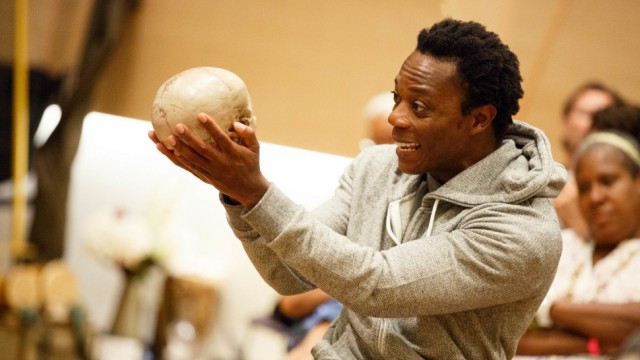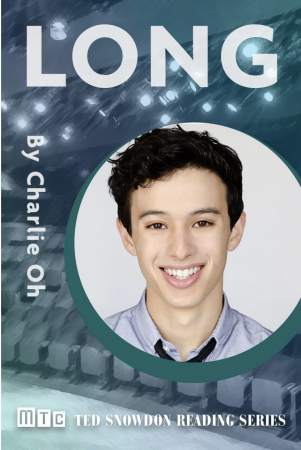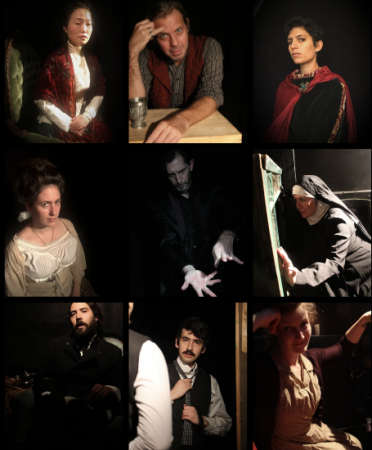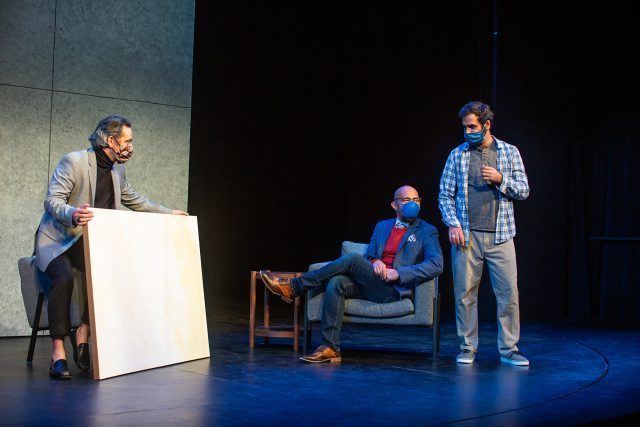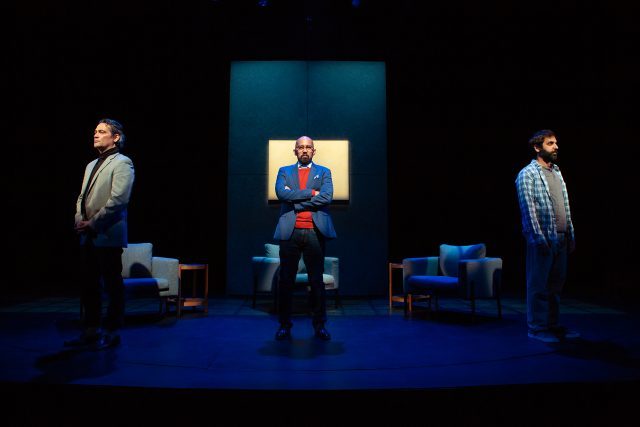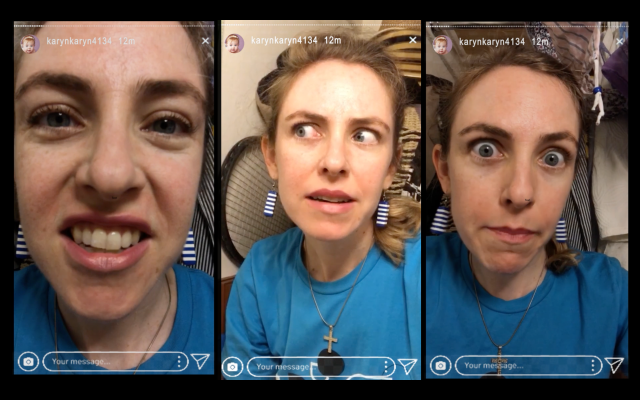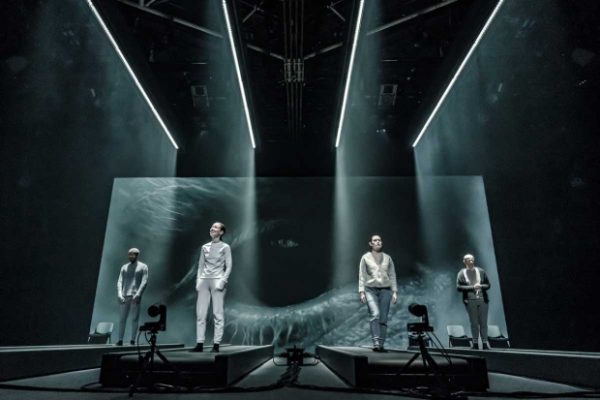
Alfred Enoch, Erin Doherty, Wendy Kweh, and Jonathan Slinger perform Crave in front of a live audience (photo © Marc Brenner)
CRAVE LIVE STREAM
Chichester Festival Theatre
October 31 – November 7 (in person through November 4), £10-£20
www.cft.org.uk
The words come flying out at a furious pace, like machine-gun fire: torture, horror, death; rape, murder, suicide; blood, despair, pain; depression is inadequate. But as dark and unrelenting as Chichester Festival Theatre’s adaptation of Sarah Kane’s Crave is, it is also thrilling and triumphant, a bold statement, live and livestreamed in the age of corona, complete with a masked audience.
In an August 1998 article in the Guardian entitled “Why can’t theatre be as gripping as footie?,” English playwright Kane compared theatrical performance onstage to the athleticism of British football on the pitch in conjunction with the premiere of her fourth play, Crave. “We had a nasty injury scare,” she wrote, equating theater and sports. “During the second preview, Paul Hickey had to stop the performance due to sudden paralysis on one side of his face. The entire company was aghast, fearing he’d had a stroke. The doctor assured us it was merely hyperventilation (read ‘overacting’) caused by the ludicrous demands set by my text and [director] Vicky [Featherstone]’s insistence on performance. But it’s only by making such demands that there’s a chance of accurate expression of ideas and emotion, and direct intellectual, emotional, and physical contact with the needs of the audience. There are some wonderful performers in Edinburgh this year who are prepared to take risks in order to meet those demands and needs.”
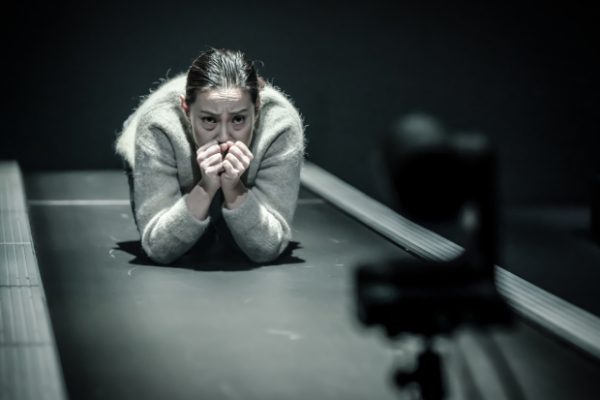
C (Erin Doherty) reveals her demons in Chichester revival of Sarah Kane play (photo © Marc Brenner)
There are also some wonderful performers in Chichester today who are taking risks in order to meet the demands and needs of director Tinuke Craig’s fierce, indefatigable production. Originally scheduled for the Spielgeltent, it was postponed because of the pandemic, then began in-person shows on the main stage with a masked audience for an October 31 – November 7 run, with each performance livestreamed around the world, a first for the company. But when Prime Minister Boris Johnson reinstated the lockdown, it was quickly announced that the show would continue only through November 4 with an audience, after which the play will be performed live to an empty house through November 7, seen only by people at home. That’s a shame, because at the end of the November 2 show I watched from my apartment across the pond in New York City — where Kane wrote most of Crave — it was genuinely stirring to see a real audience stand and applaud at the end as the four exhausted actors took their well-deserved bows.
Crave consists of four monologues with no stage directions; after three plays — Blasted, Phaedra’s Love, and Cleansed — for which Kane gave specific instructions about performance, Kane left her fourth work up to the director and company to do with as they see fit. And what Craig (random/generations, dirty butterfly) has done with it is a marvel. The fifty-minute play stars Erin Doherty as C, Alfred Enoch as B, Wendy Kweh as M, and Jonathan Slinger as A. Each actor is positioned on their own narrow black conveyor belt, parallel to one another, moving them backward and forward, sometimes in unison, other times at different paces. At the front of each belt is a camera that occasionally projects live images onto screens on three sides of the stage; those visuals mix with prerecorded video of the actors, in addition to mysterious scenes of smokey fog and the universe. The actors, dressed in drab gray, white, and black clothing, stand and sit as they call out their lines one at a time, talking about love and loss, beauty and fear. (The wardrobe is by Loz Tait, with movement choreography, approximating modern dance, by Jenny Ogilvie.) “What have they done to us?” one character asks. “No one can hate me more than I hate myself,” another says.
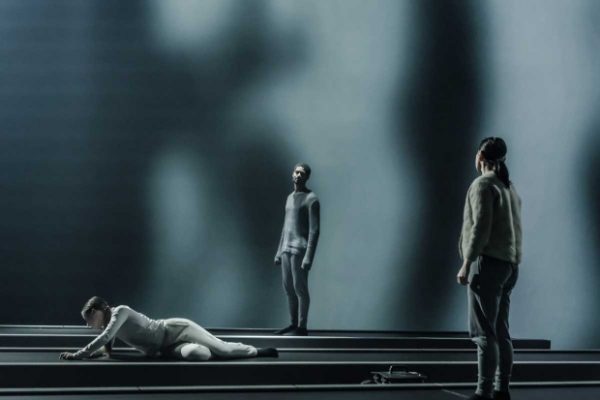
Technical innovation is one of the stars in Crave livestream (photo © Marc Brenner)
The text was inspired by T. S. Eliot’s The Waste Land and biblical passages, and it’s hard not to hear it without considering Kane’s fate. “Why did I not die at birth?” one character wonders. In February 1999, shortly after completing her fifth and last play, Psychosis 4.48, Kane killed herself, a few weeks after her twenty-eighth birthday. But that does not cast a pall over the proceedings. Crave is an intense and satisfying piece of theater, in many ways a celebration of life. The cast is phenomenal, each actor developing their own personality as they share the inner souls of characters trying to break free. The technical aspects are outstanding, with a vibrant and powerful revolving set by Alex Lowde, haunting imagery by film designer Ravi Deepres, eerie lighting by Joshua Pharo, and stark music and sound by Anna Clock. Additional cameras follow the action from multiple angles, offering closeups and side views and even revealing the audience. The livestream can only be experienced in real time; there is no rewinding, no watching later, and if you pause the feed, you will rejoin it in progress.
At its deepest heart, Crave is about making connections, an endeavor that has changed dramatically around the world in 2020, and none of us knows what exactly lies ahead, either in real life or onstage. At Chichester, the four actors never touch. The seats, temporarily filled with a masked audience, will again be empty as the pandemic rages on. But theater is necessary, especially at a time like this, and especially in an electrifying production that will get you through the bleakest night.
